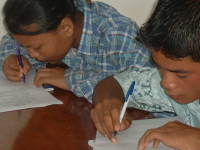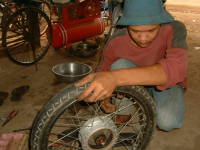Background

One of the negative effects of urbanisation is that the number of street children and youths at risk is increasing. The increase in crime is associated with growing drug trafficking and the globalisation of organised crime, which tends to draw on young delinquents as a source of cheap labour, so exacerbating the juvenile urban crime rate. The issues concerning youths at risk will have to be addressed within the context of a rather complicated multiple-causation of poverty and social problems such as urban violence, trafficking, and drugs. There has been a gap in the support for youths beyond the age of 16, when they reach the age of 16, they are regarded as adults and are no longer eligible for the programmes targeting street children. The project is designed to provide psychological and educational support that will empower urban youths at risk (15-19 years old), allowing them to restore their human dignity and break the cycle of poverty. Through the establishment and subsequent support of the ""House for Youth"" in Battambang, Cambodia and Ho-Chi-Minh-City, Vietnam, target youths will be given assistance to help transform themselves into active members of society. The project’s approach promotes re-integration of youths at risk, rather than "more protection" or "segregation."
Results

"House for Youth" has been well established in Battambang, Cambodia.In 2003, a total of 72 youths (former street children, orphans, abused children) have been accommodated at the House and provided with educational and job training opportunities. During this year, 11 have successfully graduated.In Battambang, 19 community based workshops were organised in 3 districts to raise awareness of the issues faced by disadvantaged children and youths, including human trafficking, abuse cases, intervention networks for child protection. 15 video sessions were organised.A total of 11,509 persons have attended these workshops and video sessions. A Provincial Workshop was organised in collaboration with Department of Social Affairs, Labour, Vocational Training and Youth Rehabilitation of Battambang Province (DSALVY), Provincial Child Protection Committee (PCPC), and UNICEF.The workshop examined the definition of youth at risks and recommended the agenda of youth at risk be taken up as part of the PCPC agenda.In Vietnam, the "House for Youth" was launched in April and accommodated a total of 15. Educator's street work and networking has benefited a total of 48. A study visit was organised for Ho-chi Minh City Unions of Friendship Organisation (HUFO) to KnK, the Philippines to learn more about KnK's approach to youth at risks. The project supports to restore human dignity of youths who have been segregated from the society.This has also contributed to the urban security and the reduction of urban poverty.
Partners
Ministry of Urban Development, Government of India; Government of Andhra Pradesh State; Municipal Corporation Hyderabad(MCH); Hyderabad Metro Water Supply and Sewerage Board; Administrative Staff College of India, Hyderabad(ASCI); Cities Alliance, Water and Sanitation Programme - South Asia (WSP-SA), Urban Management Programme - South Asia(UMP-SA)






































